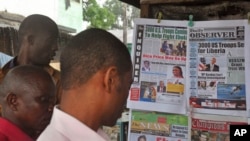It is lunchtime in Monrovia and the smell of chlorine is everywhere.
Jacey Toe sits on her wooden cart under an umbrella while eating yellow saffron rice with fresh fish from the nearby ocean. The young street vendor, and mother of two, sells toothpaste, tissue and soap. The Ministry of Finance is just up the street.
Toe said business is not going well these days. She makes about $18 a month. Before the Ebola crisis, her income was almost four times more.
"Well, life in Monrovia is very difficult. The street people are not fine. Business [is] not running. Most of the government ministries are closed. [There are] no jobs,” she said.
Another problem is that schools are closed and her children have to stay at home and have nothing to do.
Six months into the world’s worst Ebola outbreak, Monrovians like Toe say the situation remains tense.
But there is a growing sense of optimism the epidemic can be contained in Liberia, where citizens said they welcomed the help of the United States as the first of 3,000 soldiers arrived in the country to assist with medical logistics.
“We pray that the American troops come and be able to help our Liberian sisters and brothers. Because it is killing a lot of people," Toe said.
Many share her optimism.
Among other things, the United States has committed $175 million and will build 17 new health care facilities in the region with 100 beds each and train up to 500 health care providers per week.
Liberian President Ellen Johnson Sirleaf called America’s help “a significant moment in the battle against Ebola." She has promised she will not rest until Ebola is defeated.
More than 100 U.S. military personnel should be in West Africa by the end of the week with more to follow.
But 49-year-old community worker Matthew Sandiki said America’s help is only a starting point.
“We also call on other nations, Germany, to join America, to help us fight Ebola because we cannot do it alone. Our health [care] system has broken down completely.”
After U.S. President Barack Obama announced the U.S. troop deployment, the U.N.Security Council issued a call for all nations to provide assistance, calling Ebola a threat to international security.
At SKD sports complex, named after Liberia’s former president Samuel Doe, the United Nations is building a new transit hub to receive the loads of cargo that Liberia needs to contain the crisis.
Construction supervisor Kennet Blixt said the site was chosen because of its location.
“It is very convenient, close to the airport and pretty much on the main roads going up country and avoiding the city. Currently, most of the city’s storage capacities are at the port. So, to take it there from the airport, you have to go through the entire city,” he said.
West Africa has been battling with other nations’ travel restrictions, something the World Health Organization says is unnecessary and will hamper international relief efforts.
Ebola has infected more than 5,600 people and killed more than 2,800 this year, mostly in Guinea, Liberia, and Sierra Leone.
The World Health Organization said the number of people infected with Ebola could grow at an "explosive" rate, exceeding 20,000 by November, unless more is done quickly to control the outbreak.










